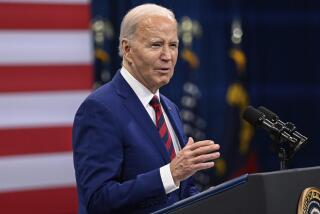Republicans would be blamed for ‘fiscal cliff,’ but does it matter?
- Share via
About half of Americans believe Congress and President Obama won’t reach agreement to stave off sharp spending cuts and tax hikes in the new year and most will blame Republican lawmakers for such a failure, a new poll shows.
The findings from the Pew Research Center for the People & the Press sound ominous for Republicans in the House and Senate, but they may be less persuasive than it would first appear to those determined to hold out against the White House.
Why?
Because Pew surveys across the entire nation, not in individual states and House districts. Members of Congress do not have to align themselves with a broad national consensus. To get reelected, they only have to please home-state and hometown constituencies.
PHOTOS: The best shots from the 2012 campaign
The Republicans holding out against Obama’s call for higher taxes on the wealthiest Americans mostly ran on platforms opposed to all tax increases. Those in the House just won reelection on that stand, as did some in the Senate. It must seem unlikely to them that the position they staked out this fall will hurt them when they go on the ballot again in 2014 and beyond.
Still, the Pew findings cannot be heartening to those doing battle with the president.
Asked who would be more to blame if the government cannot reach an agreement to avoid the year-end “fiscal cliff” budget changes, 53% of those surveyed said they would blame Republicans in Congress. Just 27% said they would blame Obama.
Forty percent of those surveyed said they expect the two sides to reach an agreement. But 49% said they expect the stalemate to continue beyond Jan. 1. Democrats were considerably more optimistic, with 55% saying they expect a deal, while just 22% of Republicans do.
Pew conducted the survey Nov. 28-Dec. 2, along with the Washington Post. They surveyed 1,003 adults.
Pew found that the fiscal cliff stalemate remains the most closely watched story in the country, with 40% of those surveyed saying they were paying very close attention. That was double the number closely watching the debate over whether U.N. Ambassador Susan Rice should become secretary of State.
Follow Politics Now on Twitter and Facebook
Twitter: @latimesrainey
More to Read
Inside the business of entertainment
The Wide Shot brings you news, analysis and insights on everything from streaming wars to production — and what it all means for the future.
You may occasionally receive promotional content from the Los Angeles Times.











